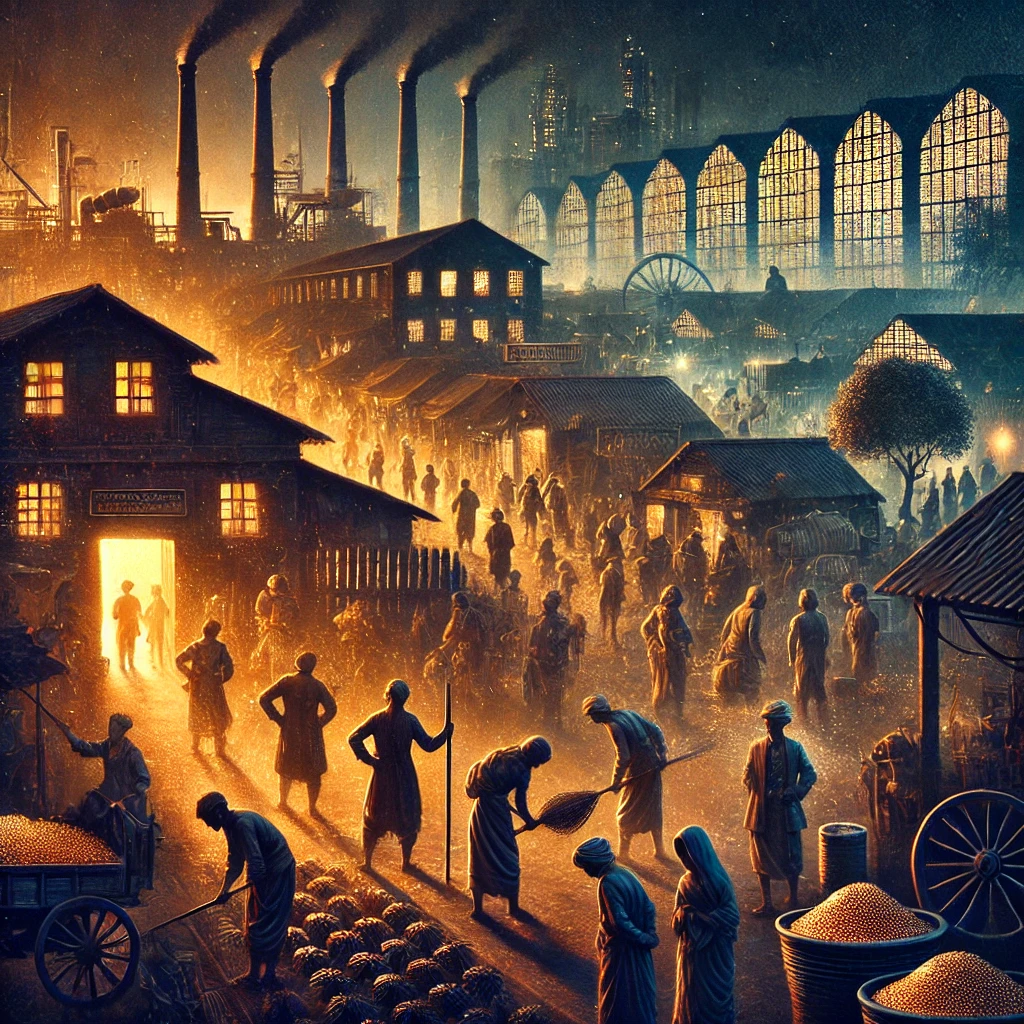Economic crises have historically had far-reaching effects, and the Great Depression of 1929 was no exception. Though it originated in the United States, the economic depression had global consequences, affecting colonies like India under British rule. As a colonial economy, India was deeply integrated into the global trade system but had little control over its own economic policies. The economic depression exposed the vulnerabilities of India’s economy under British control, leading to agrarian distress, unemployment, industrial stagnation, and financial instability. This period deepened economic hardships for Indians while further strengthening the exploitative nature of British economic policies.
Background: India’s Colonial Economy Before the Depression
Before analyzing the impact of the economic depression, it is essential to understand India’s economic structure under British rule:
- Agriculture-Dependent Economy: Nearly 70% of India’s population was engaged in agriculture, with farmers primarily producing cash crops like cotton, jute, indigo, and tea for export rather than food for domestic consumption.
- Heavy Dependence on British Trade: India’s trade policies were dictated by British interests. The country served as a supplier of raw materials to British industries and a market for British manufactured goods.
- Limited Industrialization: The British discouraged Indian industries to avoid competition with their own, leading to slow industrial growth and dependence on imports.
- Exploitative Taxation System: The British introduced high land revenue systems, like the Zamindari and Ryotwari systems, which burdened farmers with excessive taxes, even during economic hardships.
This colonial economic model left India highly vulnerable to global economic shocks, such as the Great Depression.
The Onset of the Great Depression and Its Global Effects
The Great Depression began in 1929, with the collapse of the New York Stock Exchange. It triggered a chain reaction, leading to massive declines in global trade, falling agricultural prices, widespread unemployment, and financial instability.
- Global trade declined by 50%, directly impacting economies that depended on exports.
- Prices of commodities like cotton, jute, and wheat plummeted, leading to severe losses for agricultural economies like India.
- Industrialized nations cut back on imports, affecting economies that relied on export-oriented production.
Since India was an export-driven economy controlled by Britain, the Great Depression had devastating consequences on Indian farmers, industries, and trade.
Effects of the Economic Depression on India
1. Agricultural Crisis and Rural Distress
One of the worst-hit sectors in India was agriculture, as global demand for Indian cash crops collapsed.
- The prices of crops like cotton, jute, wheat, and tea dropped by 50%-60%, reducing the income of farmers.
- Peasants were unable to pay land revenue and debts, leading to widespread evictions and loss of land.
- Rural indebtedness increased, with moneylenders exploiting farmers by charging high-interest rates.
- Famines and food shortages worsened, as cash crop production took precedence over food cultivation.
Since British policies prioritized exports over local needs, the depression further exposed the failure of colonial economic policies to safeguard Indian farmers.
2. Industrial Slowdown and Rising Unemployment
Although India had a small industrial sector, it was also deeply affected by the depression:
- Reduced global demand for Indian textiles and other manufactured goods led to factory closures and widespread unemployment.
- British goods flooded the Indian market, making it difficult for local industries to survive.
- Thousands of workers in textile mills, jute factories, and mining industries lost their jobs, leading to growing urban poverty.
- The banking sector was hit, with many small businesses going bankrupt due to lack of credit and falling demand.
Thus, the depression halted industrial progress, further entrenching India’s dependence on Britain.
3. Decline in Trade and Revenue Loss
India’s economy was highly dependent on international trade, which declined sharply during the depression:
- Exports fell by nearly 50%, leading to a major trade deficit.
- The value of Indian goods in global markets collapsed, leading to a drastic fall in government revenues.
- British policies prioritized protecting their own economy, rather than helping India recover.
- The colonial government continued to collect high taxes despite economic hardships, worsening public distress.
The declining revenue forced India to cut government spending, reducing investment in public welfare, education, and infrastructure.
4. British Policies Exacerbated the Crisis
Instead of providing relief, the British government used the depression to strengthen their financial control over India:
- High taxes and land revenue continued, despite falling incomes.
- The government refused to reduce interest rates on debts, increasing the financial burden on farmers and businesses.
- The British prioritized sending Indian resources and revenues to Britain, leaving the local population to suffer.
- The colonial government reduced salaries of Indian government employees, while British officials continued to receive high wages.
Such policies increased resentment against British rule, fueling nationalist sentiments.
The Depression’s Role in Strengthening the Independence Movement
The economic depression played a crucial role in mobilizing Indians against British rule. The hardships faced by farmers, workers, and businesses increased support for nationalist leaders like Mahatma Gandhi, Jawaharlal Nehru, and Subhas Chandra Bose.
1. Increased Support for Civil Disobedience Movement
The Civil Disobedience Movement (1930-34), led by Gandhi, gained massive support during the depression:
- Farmers and peasants participated in large numbers, refusing to pay taxes.
- Protests and strikes increased, demanding relief from high taxation and debt burdens.
- Boycotts of British goods intensified, promoting Indian self-reliance (Swadeshi movement).
2. Growth of Left-Wing and Socialist Movements
The economic hardships led to the rise of socialist and communist ideologies, as people sought alternatives to British economic policies:
- The All India Kisan Sabha (AIKS) emerged to fight for farmers’ rights and debt relief.
- Workers’ movements and trade unions gained momentum, demanding better wages and working conditions.
- Subhas Chandra Bose and other leaders began advocating for economic self-sufficiency and industrialization.
3. Weakening of British Economic Grip Over India
The depression revealed the exploitative nature of British policies, leading to:
- Increased calls for financial autonomy, as Indian leaders demanded control over economic policies.
- Greater political awareness, with people realizing that British rule prioritized Britain’s interests over India’s well-being.
- Pressure on the British government to introduce reforms, eventually leading to the Government of India Act, 1935, which granted limited self-governance.
Thus, the economic depression strengthened the Indian independence movement by exposing the failures of colonial rule.
Long-Term Effects of the Economic Depression on India
Although the Great Depression eventually ended, it had long-lasting effects on India’s economy:
- Increased Economic Nationalism – Indians became more determined to achieve economic self-sufficiency and reduce dependence on British trade.
- Growth of Indian Industries – The failure of British policies encouraged investment in Indian-owned businesses, which later contributed to post-independence industrialization.
- Permanent Damage to Rural Economy – The agrarian crisis continued even after the depression, keeping Indian farmers trapped in poverty and debt.
- Stronger Political Demands for Independence – The hardships during the depression convinced many Indians that only complete independence could solve India’s economic problems.
Conclusion
The economic depression of the 1930s was one of the most devastating financial crises under British rule. It exposed the deep flaws in India’s colonial economic system, worsening poverty, unemployment, and financial instability. British policies prioritized the protection of Britain’s economy over Indian well-being, leading to widespread suffering. However, this period also strengthened India’s independence movement, as economic hardships fueled mass protests, nationalist sentiment, and the demand for self-rule.
While the depression worsened India’s economic struggles, it also played a crucial role in uniting the country against colonial rule, paving the way for independence in 1947. The lessons from this period emphasized the importance of self-reliance, industrialization, and economic planning, which later shaped India’s post-independence policies.




